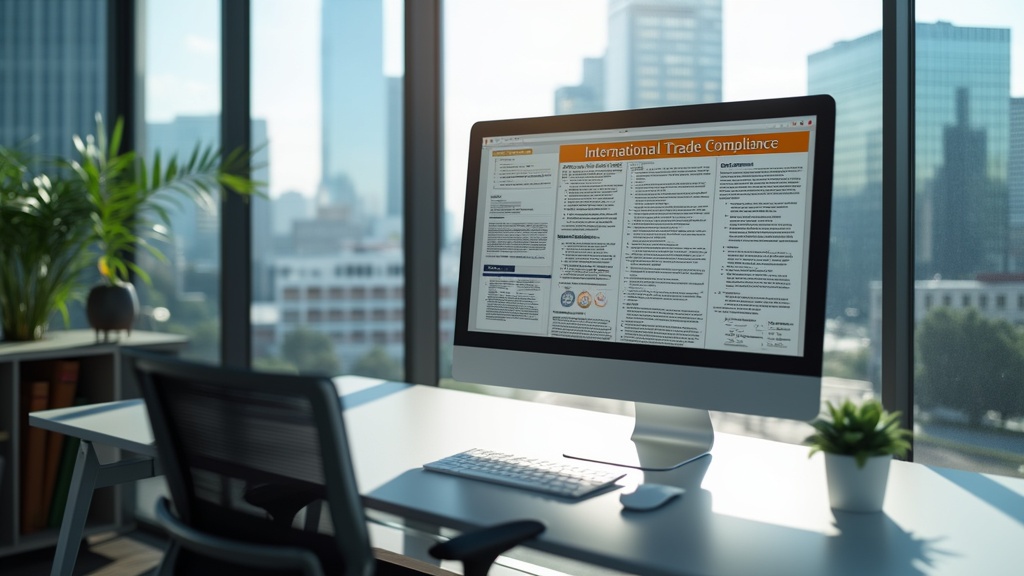Effective international trade hinges on compliance documents that streamline operations and enhance reliability. These essential documents ensure smooth transactions, reducing delays while allowing your goods to traverse borders effortlessly.
By implementing precise customs documentation, organizations can operate with confidence, fulfilling legal obligations seamlessly.
Well-prepared compliance documents not only prevent unforeseen penalties but also build robust trade relationships, boosting your company’s reputation.
Take the proactive step today—ensure your documentation is thorough and ready for global challenges!
Click here to learn more about: what documents required for international dropshipping
Export Regulations: The Key to Compliance Success
Export regulations shape the landscape for traders engaged in international markets. These regulations, enforced by agencies such as the Bureau of Industry and Security (BIS), govern essential compliance measures every exporter must adhere to.
To safeguard your enterprise, it is imperative to familiarize yourself with pivotal regulations, such as ITAR and EAR. Implementing practical strategies—like performing regular audits of your documentation standards—ensures that your imports and exports comply with legal requirements.
Staying Informed on Trade Agreements
Regular updates on trade agreements and customs regulations are necessary to enhance operational efficiency and avoid compliance pitfalls.
Incorporating effective risk management practices within your operations allows for better alignment with compliance mandates.
This proactive approach helps in identifying potential trade barriers and swiftly navigating them.
Prioritizing customs declarations and understanding relevant tariffs and duty exemptions can bolster your compliance framework.
Training: Building Compliance Awareness
Invest in compliance training for your team to strengthen your operational integrity.
Fostering awareness about regulatory compliance ensures everyone is equipped to handle shipping manifests and related documentation errors.
Staying up-to-date on export licenses and necessary import permits contributes significantly to enhancing your business’s success in global trade. Make compliance a cornerstone of your business strategy—prioritize it and watch your enterprise flourish in international operations!

What Customs Documentation Is Required
Effective customs documentation is integral to successful international trade logistics. The right paperwork can streamline customs clearance and prevent costly delays.
Essential documents needed for smooth customs clearance include:.
- Commercial Invoice: A comprehensive record of the goods being traded, detailing descriptions, quantities, and values.
- Packing List: A thorough inventory of items in a shipment, aiding customs officials in understanding its contents.
- Bill of Lading: A critical legal document between the shipper and carrier specifying the type and quantity of goods.
- Import Declaration: A necessary form declaring the nature and value of goods for duty assessment.
- Certificates of Origin: Documents certifying the origin of the products, vital for trade agreements.
Organizing these documents effectively can enhance your logistics compliance. Utilize digital tools for accessibility and perform regular audits to ensure adherence to evolving customs regulations.
Proper management of customs documentation is essential for maintaining trade relationships and ensuring uninterrupted logistics operations.
Importance Of Import Permits In Trade
Securing import permits significantly impacts trade compliance and regulatory adherence. These permits play a crucial role in overcoming regulatory barriers that may obstruct international commerce. Common types of import permits include:.
- General Import Permits: Necessary for most goods entering a country, ensuring compliance with customs regulations.
- Specialized Import Permits: Required for controlled substances like pharmaceuticals, adhering to strict regulatory standards.
- Quota Permits: Needed for items subject to import quotas under various trade agreements, ensuring fair trade practices.
To enhance your compliance management, stay updated on regulatory changes affecting import permits. Leverage relationships with local authorities to gain insights for smoother permit procurement and to navigate trade barriers effectively.
Obtaining import permits is not just about compliance; it is about facilitating smoother trade operations and fostering positive international relationships.
Customs Documentation and Import Permits
- Proper customs documentation can reduce clearance times by up to 30%, minimizing delays in shipping.
- Failure to provide necessary import permits can result in fines or confiscation of goods, impacting trade relationships.
- Over 80% of international shipments experience delays due to incomplete or improper documentation.
- Establishing good relationships with customs authorities can expedite the import permit process and enhance compliance efficiency.
Navigating Trade Compliance Challenges
Trade compliance stands as a fundamental aspect for businesses looking to excel in the global market. Compliance risks can trigger significant penalties and operational disruptions.
Companies often grapple with hurdles such as export regulations, which differ drastically across borders, complicating effective compliance management.
Common Challenges Faced by Businesses
Several common challenges emerge, affecting organizations’ ability to maintain compliance:.
- Customs documentation inconsistencies that lead to delays.
- Import permits varying by jurisdiction, complicating operations.
- Trade compliance requirements constantly evolving, demanding ongoing training.
- Shipping invoices that fail to meet regulatory standards, causing disruptions.
Strategies for Overcoming Compliance Hurdles
Overcoming these trade compliance hurdles requires proactive strategies:.
- Implementing advanced trade compliance software to streamline processes and mitigate risks.
- Conducting regular compliance audits to ensure adherence to updated regulations.
- Engaging in ongoing compliance training to empower staff and increase productivity.
- Consulting with experts to navigate complex trade agreements and emerging regulations.
Taking these steps can significantly enhance operational efficiency while providing peace of mind about compliance management.
Essential Shipping Invoices For International Trade
Shipping invoices serve as the backbone of efficient international trade operations. A well-structured customs documentation system, complete with accurate invoices, minimizes delays during customs clearance, ensuring smooth transactions across borders.
Key Components of Compliant Shipping Invoices
A compliant shipping invoice must include:.
- Item descriptions: Clear and concise details about the products.
- Values: Accurate valuation to comply with import taxes.
- Relevant trade codes: Necessary codes like the Harmonized System Code for classification.
Efficient Tracking and Management of Invoices
To effectively track and manage invoices, businesses should consider:.
- Employing digital tools that enhance record keeping and reduce errors.
- Regular audits to bolster compliance and eliminate costly documentation errors.
- Utilizing shipment tracking technologies to monitor the progress of shipments in real-time.
Maintaining accurate invoices not only expedites shipping processes, but also strengthens trade relationships, leading to increased operational efficiency and profitability.
Trade Compliance and Shipping Invoices
- Companies that invest in trade compliance software can reduce compliance-related penalties by up to 30%.
- Regular compliance audits can identify discrepancies that, if left unaddressed, may lead to fines averaging $50,000 per violation.
- Accurate shipping invoices can decrease customs clearance times by 50%, enhancing overall trade efficiency.
- Businesses that utilize digital tools for record keeping report a 40% reduction in documentation errors.
Role Of Packing Lists In Logistics Compliance
Packing lists play an indispensable role in maintaining logistics compliance across international shipping. These lists serve as a detailed inventory of shipped items, which is essential for accurate customs documentation.
With precise packing lists, organizations can expedite customs clearance and significantly minimize delays, enhancing operational efficiency.
Effective packing lists are designed to comply with trade agreements and streamline the international shipping process.
To create precise packing lists, ensure inclusion of detailed product descriptions, such as item names, quantities, and weights.
Additionally, employing standardized formats greatly aids in maintaining clarity and consistency across all shipments. Here are practical tips for producing accurate packing lists:
- Include itemized details: Ensure every product is listed with its exact specifications.
- Verify weights and dimensions: Accurate weights and dimensions prevent complications during customs inspections.
- Check against orders: Cross-reference with purchase orders to avoid errors.
Bills Of Lading And Their Legal Significance
Understanding the significance of bills of lading is essential for compliance in the shipping industry. Bills of lading act as legal contracts between carriers and shippers, establishing expectations and responsibilities. Any loss or misrepresentation of a bill of lading may lead to serious consequences regarding ownership and liability, underlining the importance of accurate documentation standards.
These documents also serve as powerful evidence in legal disputes. To avoid potential disputes, consider these critical steps:.
- Double-check details: Ensure all information is accurately reflected before shipping.
- Understand the terms: Familiarize yourself with terms associated with bills of lading to minimize misunderstandings.
- Maintain proper documentation: Adhering to rigorous documentation standards protects your interests and strengthens trade relationships.
Packing Lists and Bills of Lading
- Accurate packing lists can reduce customs clearance time by up to 30%.
- Over 70% of shipping delays are attributed to documentation errors, highlighting the importance of precise packing lists.
- Bills of lading are recognized as legal evidence in 90% of shipping disputes.
- Maintaining accurate documentation can enhance trade relationships by fostering trust and reliability.
How Tariffs Affect International Trade Agreements
Tariffs wield significant power in shaping international trade dynamics. These taxes imposed on imported goods can dramatically alter pricing strategies across global markets.
When tariffs increase, businesses encounter heightened costs, which can lead to increased prices for consumers.
This shift affects market competitiveness and influences purchasing decisions.
The Impact of Tariffs on Pricing and Competitiveness
As tariffs fluctuate, the ripple effect on pricing strategies becomes clear.
Companies must adjust to maintain competitiveness, often resorting to measures such as:.
- Optimizing pricing strategies to absorb additional costs
- Diversifying supply chains to minimize exposure to tariffs
- Engaging in proactive risk management to navigate uncertainty
These adaptations are critical for safeguarding market positions against evolving tariff regimes. When tariffs rise, businesses equipped with robust trade compliance frameworks can respond more effectively, ensuring sustained customer satisfaction and loyalty.
Navigating Trade Agreements and Compliance
Trade agreements often contain provisions aimed at reducing tariffs, creating opportunities for businesses to thrive. By leveraging these agreements, companies can enhance their competitive edge. Staying informed about regulatory updates in customs documentation is essential for maintaining compliance and optimizing operations.
Implementing effective strategies such as:.
- Investing in compliance training for staff to ensure understanding of trade laws
- Utilizing customs brokers who can streamline international logistics and compliance
- Establishing rigorous record keeping practices to mitigate errors
By prioritizing trade compliance and adapting to changing tariff landscapes, businesses position themselves for success in the complex world of international trade.
Tariffs and Trade
- According to the World Trade Organization, tariffs can increase the cost of imported goods by an average of 20%.
- Research shows that a 1% increase in tariffs can lead to a 5% decrease in import volumes.
- Businesses that actively engage in compliance training can reduce the risk of costly penalties by up to 30%.
- Companies that diversify their supply chains are 25% more resilient to tariff changes compared to those that do not.


